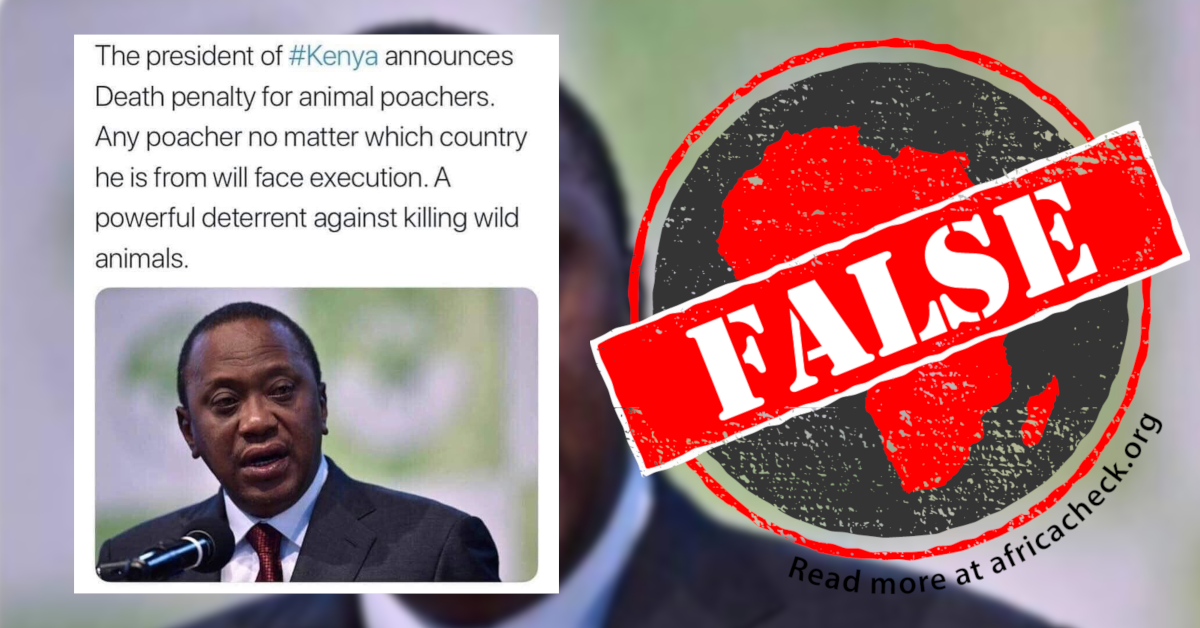Should people who love wildlife celebrate because Kenya’s president has announced the death penalty for poachers? No – partly because it’s not true.
A meme posted on the CAPEXIT Facebook page claims President Uhuru Kenyatta had said just that. And it’s causing excitement online. The comments range from “great” to “excellent”, “amazing idea” and “well done”, with some suggesting poachers in South Africa should also be executed.
The 15 May 2019 post reads: “The president of #Kenya announces death penalty for poachers. Any poacher no matter which country he is from will face execution. A powerful deterrent against killing wild animals.”
The meme was also posted on Facebook pages that support wildlife conservation on 5 April 2019 and 8 April 2019.

The country’s Wildlife Management and Conservation Act 2013 includes the penalty of life imprisonment, but not the death sentence.
Section 92 of the act reads: “Any person who commits an offence in respect of an endangered or threatened species or in respect of any trophy of that endangered or threatened species shall be liable upon conviction to a fine of not less than twenty million shillings or imprisonment for life or to both such fine and imprisonment.”
Kenyan law does allow for the death penalty, but there hasn’t been an execution since 1987, notes the Katiba Institute, a legal think tank based in Nairobi.
In March 2019, Africa Check debunked a similar claim. This time it was that tourism minister Najib Balala had spoken of plans to introduce the death penalty for poachers.
In April, AFP published a fact-check of the same claim, which the Independent has cited. Reference to the correction also appears in Facebook comments. - Vincent Ng’ethe (04/06/19)
A meme posted on the CAPEXIT Facebook page claims President Uhuru Kenyatta had said just that. And it’s causing excitement online. The comments range from “great” to “excellent”, “amazing idea” and “well done”, with some suggesting poachers in South Africa should also be executed.
The 15 May 2019 post reads: “The president of #Kenya announces death penalty for poachers. Any poacher no matter which country he is from will face execution. A powerful deterrent against killing wild animals.”
The meme was also posted on Facebook pages that support wildlife conservation on 5 April 2019 and 8 April 2019.

Life imprisonment possible, but not death penalty
The country’s Wildlife Management and Conservation Act 2013 includes the penalty of life imprisonment, but not the death sentence.
Section 92 of the act reads: “Any person who commits an offence in respect of an endangered or threatened species or in respect of any trophy of that endangered or threatened species shall be liable upon conviction to a fine of not less than twenty million shillings or imprisonment for life or to both such fine and imprisonment.”
Kenyan law does allow for the death penalty, but there hasn’t been an execution since 1987, notes the Katiba Institute, a legal think tank based in Nairobi.
In March 2019, Africa Check debunked a similar claim. This time it was that tourism minister Najib Balala had spoken of plans to introduce the death penalty for poachers.
In April, AFP published a fact-check of the same claim, which the Independent has cited. Reference to the correction also appears in Facebook comments. - Vincent Ng’ethe (04/06/19)
Republish our content for free
For publishers: what to do if your post is rated false
A fact-checker has rated your Facebook or Instagram post as “false”, “altered”, “partly false” or “missing context”. This could have serious consequences. What do you do?
Click on our guide for the steps you should follow.
Publishers guideAfrica Check teams up with Facebook
Africa Check is a partner in Meta's third-party fact-checking programme to help stop the spread of false information on social media.
The content we rate as “false” will be downgraded on Facebook and Instagram. This means fewer people will see it.
You can also help identify false information on Facebook. This guide explains how.


Add new comment